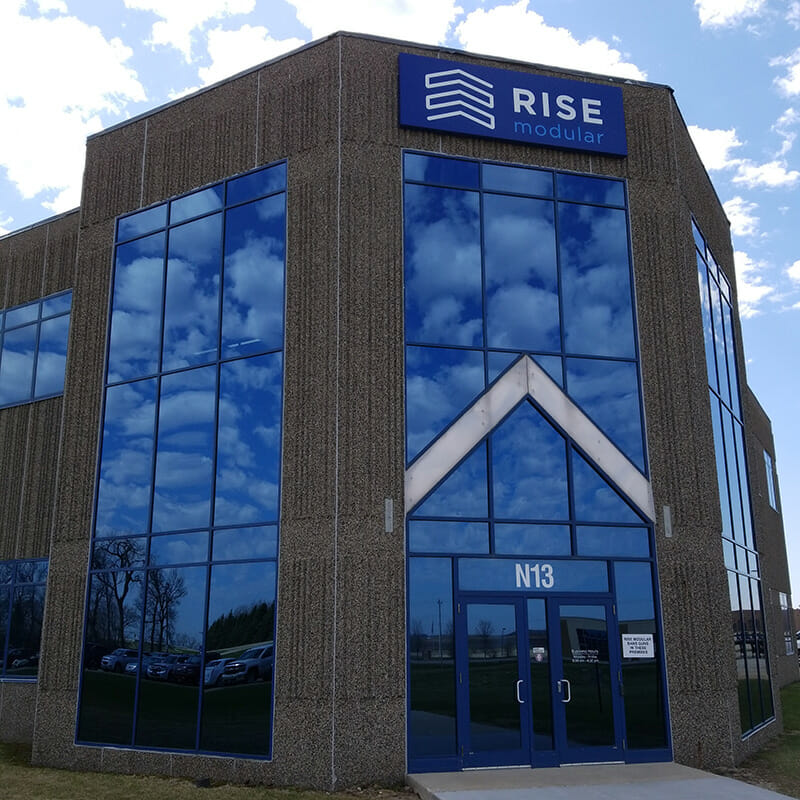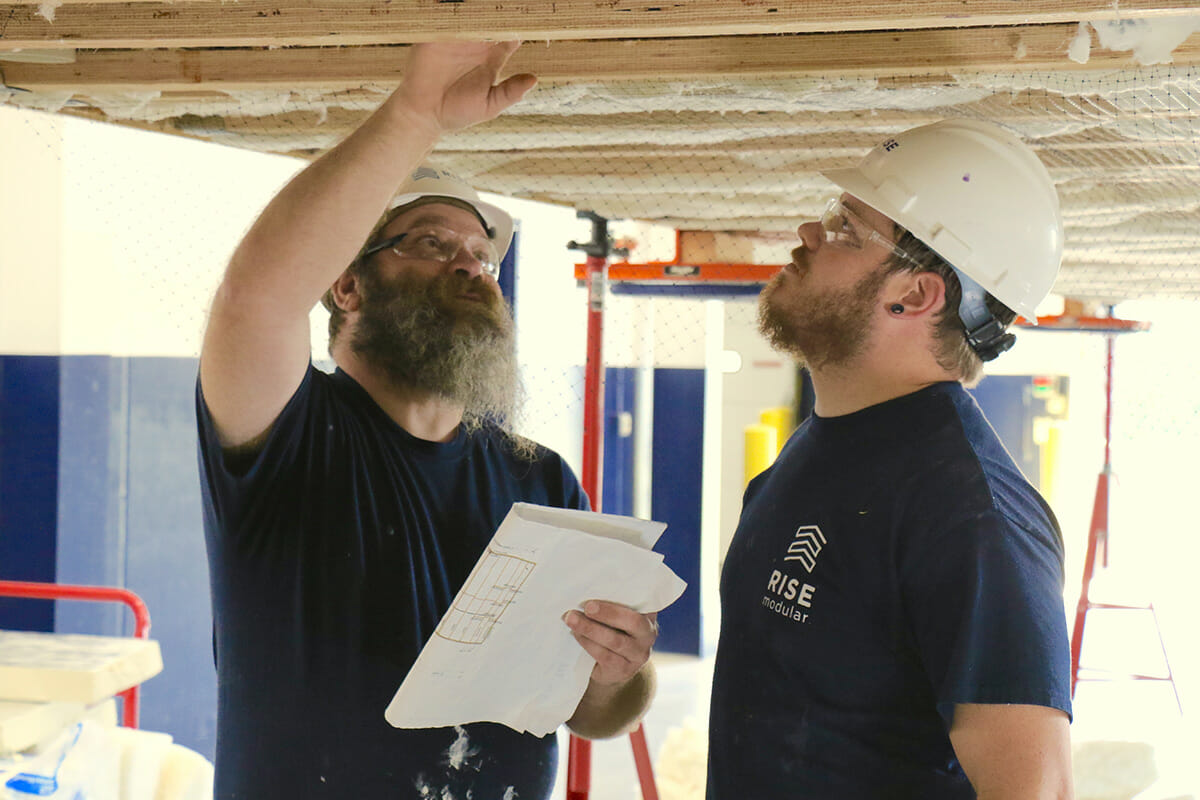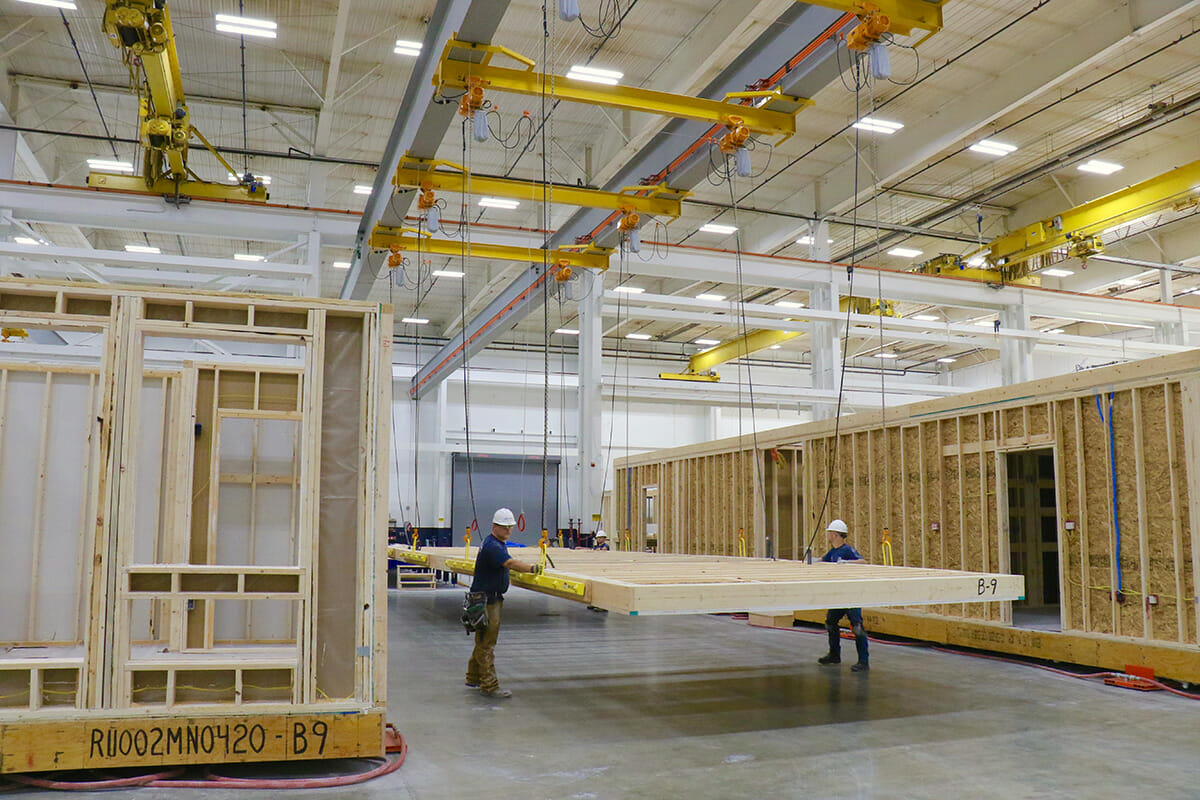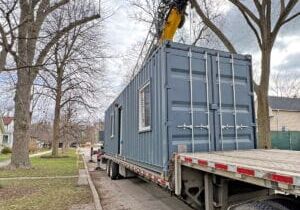Rise Modular: On the Rise in the Upper Midwest

Christian Lawrence graduated from Yale with an Economics degree, and then worked in the financial industry for several years. He is the Founder and Chief Executive Officer of the modular construction start-up, Rise Modular, LLC. The company was founded in 2018 and is based in Minnesota, USA.
First in the Market
Although there are modular builders in the Upper Midwest building single family homes, Rise Modular is the first large scale, commercial modular manufacturer in the region. (For readers outside the United States: Roughly, the Upper Midwest consists of the states North Dakota, South Dakota, Minnesota, Iowa, Wisconsin, and Michigan.)
Rise Modular bought a 140,000+ square foot facility in October 2019 and invested millions of dollars to retrofit the building and install state-of-the-art, customized, manufacturing equipment. The factory opened in April 2020, and the company already has a number of firsts to its name — including the completion of Minneapolis’ first modular multi-family or commercial building. This is Mod42, an urban infill, market rate, 30-unit apartment building.
“A lot of developers want to be the second, rather than the first to undertake a commercial modular project. Completing this project is a big milestone for us,” says Lawrence. “Now there’s a successful project that our future customers can see and touch — not just renderings.”
The company’s now starting work on its second project — a 192-unit apartment building, which will be another first. It’ll be the first modular multi-family or commercial building ever built in Minnesota’s state capital, St. Paul.

Embracing Challenges
Lawrence explains that the St. Paul site is very tight and oddly-shaped — challenges demanding design creativity. “The building is designed with the unusual architectural feature of triangular end cap units. We pride ourselves on using modular technology to help save cost and time for the developer, but without sacrificing design intent,” says Lawrence. “As well as being architecturally
interesting, net rentable square footage is maximized.”

Lawrence explains it’s an innovative, five-over-two building, “probably one of the more architecturally-interesting modular apartment buildings ever built in this country. Certainly, it’s the first of its kind in the Upper Midwest, due to its size, shape, and architectural features.”
The project demonstrates the flexibility of modular design and construction. “Modular buildings can be so much more than perfectly stacked, uniform boxes,” says Lawrence.
“We want these buildings to be really beautiful and to contribute to the built environment.”
Modular and Market Research
Lawrence has always had a passion for real estate and design. After getting his economics degree, and working in the financial sector for a few years, he bought an acreage near his hometown of Minneapolis, Minnesota. His goal was to develop a multi-family apartment complex.
As he worked through the project details, Lawrence researched the viability of using modular construction. He reached out to modular manufacturers in the area, but none of them were set up to build that kind of project. They were builders of single-family homes and they “respectfully declined my apartment project”.
As Lawrence continued his research, touring more modular plants throughout the US, he became ever more convinced that the construction method was sound. “And, from a financial perspective, using a factory assembly line process — like we do for manufacturing so many other products — just makes sense.”

Related Listening:
The "Rise" of Modular Construction in the Upper Midwest w/ Rise Modular
In this episode of Inside Modular, Christian Lawrence, founder and CEO of RISE Modular in Minneapolis, talks about the creation of RISE, meeting demand in the Upper Midwest, the value of wood-based construction, modular construction's role in affordable housing, and the future of the industry.
While searching for a solution to the problems of rapidly increasing construction costs and shrinking labor availability, Lawrence learned that modular construction has been successfully used for decades and is increasing in popularity on the coasts of the United States.
“When I realized there was demand, but no supply, for large-scale modular buildings in the upper Midwest, I began focusing on starting my own modular construction company, rather than simply building a project.”
Market research has led the company to focus on low- to mid-rise, wood-framed, multi-family (apartments, condos, student housing, and senior living) and hospitality modular manufacturing and construction — the sectors the company anticipates will generate the most robust demand.
Lawrence discovered that within 750 miles of his Minnesota location, 85% of all modular units delivered for hospitality and multi-family were wood and that whether modular, panel-built, or stick-built, regulations limit wood construction to five stories over two stories of Type I podium.
“Unlike places like New York City or Boston or Chicago, there isn’t great demand for high-rise buildings that require steel framed construction, which is more expensive than wood,” explains Lawrence. “Low- to mid-rise, wood-based construction dominates the multi-family and hospitality sectors in the Upper Midwest.”
The Future
For the time being, Lawrence says the company is focused on treating its clients well, and building successful projects. “We want our clients to become long-term partners that build projects with us every year — not just customers.”
And the near future is looking very bright. “We have 20 to 25 projects, representing over 3000 units, that are in various stages of feasibility analysis and pre-construction. We’re very excited about the short- to medium-term pipeline.”
Longer term, Lawrence says he’d like the company to expand geographically into regions of the US that either don’t have a modular supplier, or are under-supplied.
“Rise Modular wants to help grow the broader industry. This construction methodology makes a lot of sense and it can help address the affordable housing crisis in this country,” says Lawrence. “We’d like to play a role in helping to increase the housing supply, both market rate and affordable.”
About the Author: Zena Ryder is a freelance writer, specializing in writing about construction and for construction companies. You can find her at Zena, Freelance Writer or on LinkedIn.
More from Modular Advantage
An Insider’s Guide to the 2025 World of Modular
The Modular Building Institute is bringing its global World of Modular (WOM) event back to Las Vegas, and with it comes some of the industry’s best opportunities for networking, business development, and education. Over the course of the conference’s four days, there will be numerous opportunities for attendees to connect, learn, and leverage event resources to get the most out of the conference.
Affordable Housing Now: The Industry’s Best Bring New Solutions to World of Modular
While the modular building industry has long known that it can be an effective solution to increase affordable housing, the word is slowly spreading to more mainstream audiences. Three presentations at this year’s World of Modular in Las Vegas hope to provide insight and direction for those seeking a real solution to the crisis.
Opportunities for Innovation in Modular Offsite Construction
Modular Offsite Construction has already shattered the myth that it only produces uninspired, box-like designs. Architectural innovations in module geometry, configurations, materials, and products make it possible to create visually stunning buildings without sacrificing functionality or efficiency.
Safe Modular Construction with Aerofilm Air Caster Transport
In collaboration with Aerofilm Systems, Heijmans developed innovative skids using air caster technology for moving modules easily and safely. These pallets are equipped with an auto-flow system, making operation extremely simple.
Miles, Modules, and Memes: Building a Modular Network One Flight at a Time
At the end of the day, social media is just another tool for building connections, and like any other tool, needs to be used skillfully to work properly. Use social media thoughtfully, and it will open doors to real opportunities and relationships you didn’t even see coming.
Falcon Structures: Thinking Inside the Box
Some of Falcon’s latest projects include creating container solutions for New York’s Central Park and an East Coast professional baseball team. More and more, Falcon is shipping out container bathrooms and locker rooms to improve traditionally difficult work environments, like those in oil and gas or construction.
UrbanBloc—From Passion to Industry Leader
UrbanBloc specializes in three main categories or markets – what they call “Phase 0” projects, amenities, and urban infill. Clients are often attracted to shipping containers because from a real estate perspective they are considered an asset. Having the flexibility to move and transport these assets allows owners to respond to different circumstances in a fluid manner that they can’t get with standard construction.
The Hospitality Game-Changer
“Hospitality is about more than just providing a service – it’s about delivering an experience,” says Anthony Halsch, CEO of ROXBOX. “And that’s where containers thrive. They allow us to create spaces that are unique, efficient, and sustainable.”
Container Conversions Counts on Simplicity to Provide Critical Solutions
Container Conversions has fabricated and developed thousands of containers for varied projects, including rental refrigeration options, offices, kitchens, temporary workplace housing, and mobile health clinics.
Revelution Containers and S. I. Container Builds: On a Mission to Revelutionize Housing
Rory Rubun and Pam Bardhi are on a mission to create more housing. Together, they plan to build shipping container eco communities similar to single-family subdivisions, and mixed-use buildings in urban settings. They also want to expand the footprint of ADUs across the nation.










